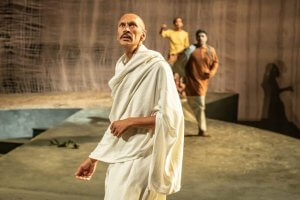
https://www.thestage.co.uk/reviews/the-father-and-the-assassin-review-olivier-national-theatre-london-hiran-abeysekera
The Stage
4 stars out of 5
The Father and the Assassin review
“An extraordinary performance”
REVIEWSSEP 15, 2023BY SIOBHAN MURPHYNATIONAL THEATRE, LONDON
Gandhi’s killer struts the stage in a challenging play about modern India’s birth and the lure of extremism
The man who rises out of the floor of the Olivier stage is bloodstained, cocksure and defiant. “Take a good look – you’ve paid good money to be here,” he says, eyeing the National Theatre audience as he preens before us. And look you must: the Olivier-winner Hiran Abeysekera, taking on the role of Nathuram Godse in Indhu Rubasingham’s revival of Anupama Chandrasekhar’s 2022 play, is a constant enthralling presence for the next two hours.
Godse is the assassin of the play’s title – a bold, fictional rendering of the man who, in 1948, murdered Mohandas Gandhi. There’s a fair chance you don’t know his name – but in India, since Narendra Modi’s BJP party has been in office, stoking Hindu nationalist sentiment, quite the cult of personality has been building around Godse, with statues erected in his honour. So our populism-blighted present hovers over Chandrasekhar’s play (there’s even a joke about Brexit) as it presents us with the story of Godse (heavily fictionalised from the few facts known about him), and of the painful birth of modern India.
Rajha Shakiry’s revolving staging and a good ensemble cast work hard as we flip about in time, from Raj-era Western India, where Godse grew up, to the backrooms of power with Nehru and Jinnah, to Gandhi’s boycotts and salt marches, to Godse’s prison cell. There’s an awful lot of history to cover – from the stands against the Raj to the horrors of partition – and some of the chewier lumps of exposition defy Rubasingham’s attempts to keep the production dynamic.
But she draws an extraordinary performance from Abeysekera, the star of Life of Pi, who has taken over the role from original cast member Shubham Saraf. He peacocks with utter assurance, giving us a Godse who can flick from childlike to menacing in an instant – a trickster and provocateur, always confrontational, telling us to switch off our “British scepticism” with a glint in his eye, his mobile features rarely still.
Godse was born to high-caste Hindu parents who, after the death of three infant sons, believed their male line was cursed and brought Godse up as a girl, to protect him. In this guise, he had visions and was treated as an oracle of the goddess Durga – when he rebelled against his enforced gender swap, the visions left him. This confused and angry boy became, Chandrasekhar seems to be saying, an empty vessel, ready for others to fill with their ideas.
First it’s Gandhi (played rather affectedly by Paul Bazely), until Godse decides the lawyer’s non-violent and conciliatory approach to winning independence is betraying the nation. Then it’s Gandhi’s antithesis, the fascistic Hindu nationalist Vinayak Savarkar (a forbiddingly still Tony Jayawardena), who looks to Nazi Germany for ideas about how to deal with India’s “Muslim problem”.
Much as with Aravind Adiga’s Booker-winning The White Tiger – also a first-person account of an unrepentant killer – Chandrasekhar and Rubasingham seem to be testing us, with Abeysekera as a perfect vehicle. Here’s a fast-talking, hugely charismatic man, bold, brazen and enthrallingly arrogant, able to summon winning humour out of the smallest physical movement. How easy it is to be drawn in. How far will you go along with him before you recoil? Or are you still there when he launches into his spittle-flecked, post-execution rant about the enemy living next door?